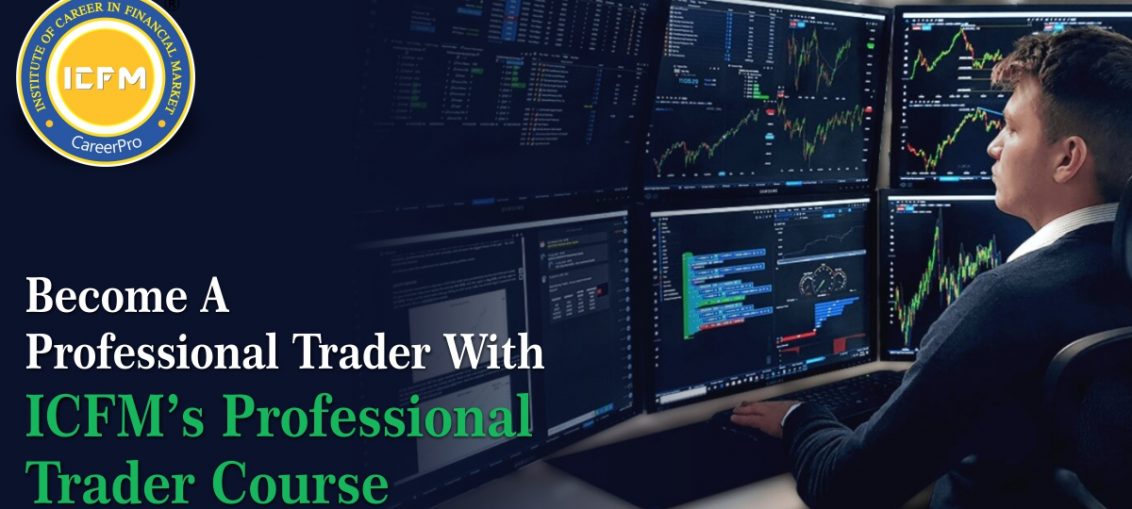
In today’s world people are engaging themselves in stock trading and making a full-time career, while others are taking it as a hobby. Amateur traders can become professional traders through professional trader course, producing profitable results. One can know what techniques are most beneficial to succeed in the market. Here we will discuss further, how can you become a professional trader through Professional Trader Course, what specialization is required, and how much you will earn from it.
-
Who is a professional trader?
He is a person who is full-time engaged in trading as a career and understands every nook and corner of finance and business. There are varieties of options to pursue like freelancer traders for individual clients, wealth manager at a wealth management firm, at a trading company.
The education and experience required for each of them may vary but the job duties may be a bit similar.
ICFM is giving a rising opportunity to all the upcoming market leaders to learn professional trading in Chennai.
The title you can hold other than above:
- Swing trader- working on positions over multiple days expecting profits from long-term fluctuations.
- Day trader- opens and closes the position at the start and end of each trading day.
-
How one can become a professional through an online professional trader course?
A professional trader has the goal of turning the investment deal into profits. Here, he has certain duties of developing strategies, analyzing stock markets, reviewing trades and positions, and making good connections with leaders in this industry.
You can even learn this professional course online as well with the ease of your home.
Related- Learn trading online in Mumbai
LADDER YOU CAN CLIMB UP TO BECOME A SUCCESSFUL TRADER.
-
Learn the basics of trading
- The amount required for trading
- Information about bid and ask price
- Where to trade
- The best way out to check trade performance
- Type of order and how to place them
- Risk management practices
- Trading hours
-
Learn the advanced basics
To start anything, need to decide where you want to work, like
- Options-Investment contracts that give the trader the right to buy or sell the asset for a specific price by a certain date.
- Futures– A Future is a contract to buy or sell an underlying stock or other asset at a pre-determined price on a specific date.
- Stocks-Investment that represents an ownership share in a company.
Once you decide where you want to make your career, then you can master it at an advanced level. After learning trading basics from professional trader course, one can move towards advancement by learning it through professional traders and techniques.
-
Should develop trading techniques and systems
Unlike basics, when we develop techniques, it is highly subjective and applied to a particular situation only. One should look for sources and mentors that provide charts and details to analyze the stock or index over months and years.
Real-life professional traders would help us in finding better strategies in different situations. Practical learning and live trading demos would be highly effective and can give a real-life experience of trading without making a loss.
Related- ICFM would help in giving professional trading experience and one can learn via Professional Trader Course.
-
Real trading experience
Live demos, tracking stocks, and punching your trade by yourself will surely give you a kick to grab real-time profits in the market. When you make trades in real-time markets will give you an edge to build better strategies in your theoretical learning. You can test and learn from your trades that what strategy will go for what situation.
-
Choose a trustworthy broker
Some of the credit for better progress and profits might go to the right broker also. A broker is an intermediate who creates an environment for traders and sellers to meet and trade take space. Brokerage firms charge opening or brokerage fees on the trades but finding a broker that deals in or works with sellers of your niche can give you a more profitable situation.
-
Always keep a trade journal
Always keep track of your trades for future reference and to learn from any mistakes that happened. Start with recording the trade data of each trade, either digitally or in paper form.
Following are the elements you need to record in your journal:
–Market– info. An=bout the market in which you are trading
–Factor– makes you enter into the trade
–Date– date of entry
–Time– time frame of the trade
–Lot size– no. of items purchased in that trade
–Position– long or short, as per the expectation to increase or decrease
–Tick value– minimum movement of the price of the investment
–Price in– price you paid for share to enter the trade
–Price out– price paid to exit the trade
–Stop loss– price to be paid when feel necessary to exit
–Profit and loss-amount profit and loss made from each trade
–Initial risk– amount of money, willing to lose on trade
Related: Get professional learning on stock market from ICFM.